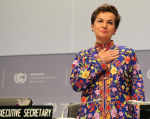Taking place in the shadow of the historic Paris Conference, the Bonn Climate Change Conference of the UNFCCC was a low-profile meeting.
It nevertheless had an ambitious agenda.
It included the 44th sessions of the Subsidiary Body for Implementation (SBI 44) and the Subsidiary Body for Scientific and Technological Advice (SBSTA 44), and the first meeting of the Ad Hoc Working Group on the Paris Agreement (APA 1), the body created in Paris to prepare for the entry into force of the Agreement.
The SBI and SBSTA were expected to take up a large list of issues that had been postponed in the run up to Paris, when the Ad Hoc Working Group on the Durban Platform for Enhanced Action (ADP) had taken center stage.
 26 May 2016: Taking place in the shadow of the historic Paris Conference, the Bonn Climate Change Conference of the UNFCCC was a low-profile meeting. It nevertheless had an ambitious agenda. It included the 44th sessions of the Subsidiary Body for Implementation (SBI 44) and the Subsidiary Body for Scientific and Technological Advice (SBSTA 44), and the first meeting of the Ad Hoc Working Group on the Paris Agreement (APA 1), the body created in Paris to prepare for the entry into force of the Agreement. The SBI and SBSTA were expected to take up a large list of issues that had been postponed in the run up to Paris, when the Ad Hoc Working Group on the Durban Platform for Enhanced Action (ADP) had taken center stage.
26 May 2016: Taking place in the shadow of the historic Paris Conference, the Bonn Climate Change Conference of the UNFCCC was a low-profile meeting. It nevertheless had an ambitious agenda. It included the 44th sessions of the Subsidiary Body for Implementation (SBI 44) and the Subsidiary Body for Scientific and Technological Advice (SBSTA 44), and the first meeting of the Ad Hoc Working Group on the Paris Agreement (APA 1), the body created in Paris to prepare for the entry into force of the Agreement. The SBI and SBSTA were expected to take up a large list of issues that had been postponed in the run up to Paris, when the Ad Hoc Working Group on the Durban Platform for Enhanced Action (ADP) had taken center stage.
Approximately 1,900 government delegates, 1,500 observers and 100 media representatives attended the meeting, which convened from 16-26 May 2016, in Bonn, Germany. APA 1 adopted its agenda, heard initial views on its work mandated by the Paris Agreement and adopted its conclusions for further work.
SBI 44 adopted several conclusions related to its regular work on implementation, including on mechanisms under the Kyoto Protocol, capacity building, gender and national adaptation plans (NAPs). It also began work on issues mandated by the Paris Agreement, including the development of modalities and procedures for a public registry for nationally determined contributions (NDCs), and for adaptation communications.
SBSTA 44 adopted several conclusions, including on methodological issues under the Convention, and the Protocol, and the Nairobi work programme on impacts, vulnerability and adaptation to climate change (NWP). SBSTA 44 also began consideration of issues mandated to it by the Paris Agreement, including on the technology framework and modalities for Article 6 of the Agreement (cooperative approaches).
The Bonn session initiated work on building the necessary foundation for the operationalization of the Paris Agreement, not only by launching work under the APA, but also by identifying overlaps and synergies among the tasks of the three subsidiary bodies, a key endeavor for the coherence of the future climate regime. Delegates also started making the transition to a more technical phase of work, although under the APA, they did not agree to any calls for technical papers or technical workshops, which would have provided the basis for digging deeper into these questions at COP 22. [IISD RS Coverage] [Bonn Climate Change Conference Website]